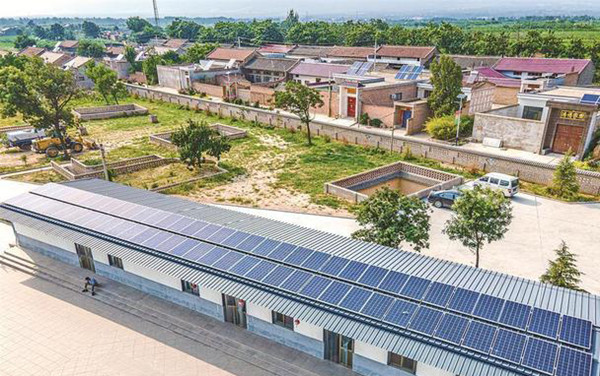Shanxi village pursues quest for carbon neutrality
Updated: 2021-08-26

Rooftop photovoltaic panels are installed in Zhuangshang village in Shanxi province. [Photo/Yuncheng Daily]
Zhuangshang village located in Ruicheng county in North China's Shanxi province is one of the first villages to pursue the dream of going zero carbon.
That's through the development of new energy in the "China Zero Carbon Village Project" of the Ministry of Agriculture and Rural Development and the United Nations Development Programme.
In the homes of villagers, solar power panels are appearing along with low voltage DC power supply systems, energy storage equipment and home appliances. They mark the introduction of a new type of power system – the photovoltaic power generation, energy storage, DC, and flexible application system, or PEDF.
"Currently, 27 households in the village are included in the new system," said Chen Wenbo, founder of the PEDF system.
"Since last year, the system has generated 24,531.8 kWh of electricity, of which 9,693.3 kWh has been connected to the national grid, saving the equivalent of 9,813 kilograms of standard coal and reducing 24,459 kg of carbon dioxide emissions," Chen added.
"The data from these 27 households proves that each household can be self-sufficient in electricity by installing 10 rooftop photovoltaic panels, totaling 5kW.”
With the 10kW photovoltaic panels installed in each household and the operation of the PEDF system, the whole village will generate 2 megawatts of electricity and half the electricity will be supplied to the national grid for urban areas and industrial production, according to Chen.
As a result, the rural areas will reverse their current role of being electricity users to become power providers, integrating electricity production and consumption and helping with carbon neutrality.
The ancient village has also put its own carbon neutrality plan into practice, by developing itself into "zero-carbon" cultural tourism scenic spot with the support of the PEDF system.
More than 20 abandoned cave dwellings in the village have been renovated, retaining the cave culture and folk customs on the banks of the Yellow River – as well as featuring clean energy consumption and an eco-friendly lifestyle, as solar power meets tourists' daily energy consumption demands.
The village now attracts more than 100 tourists every day and helps more than 10 villagers to be self-employed, thanks to rural tourism supported by the PEDF system.
Chen said Zhuangshang village's successful quest for development under the carbon neutrality initiative will be promoted across Ruicheng county this year.
It's estimated that Ruicheng will realize peak carbon dioxide emissions within five years and achieve carbon neutrality by 2035, potentially becoming the first county to realize carbon neutrality in the nation.



